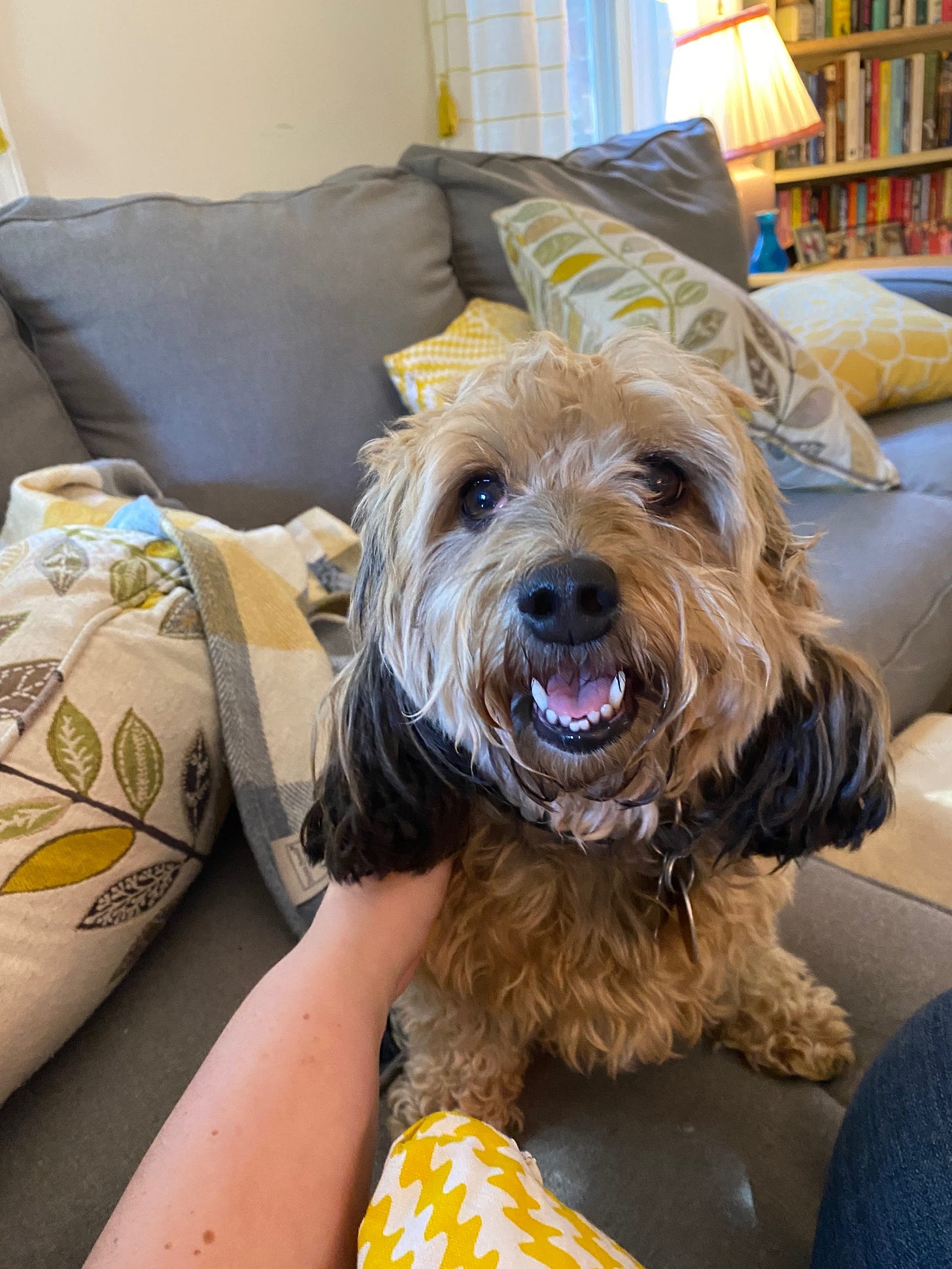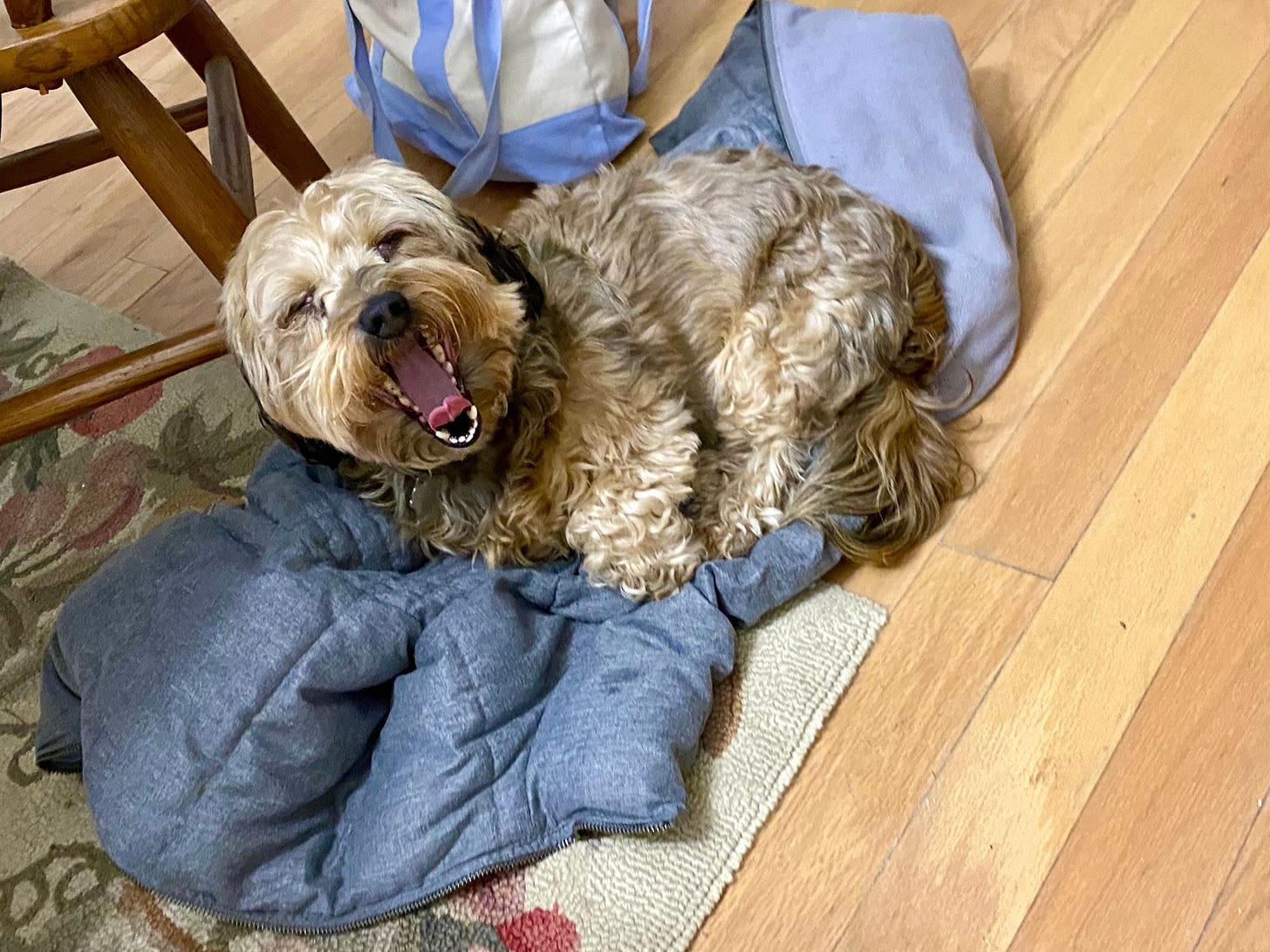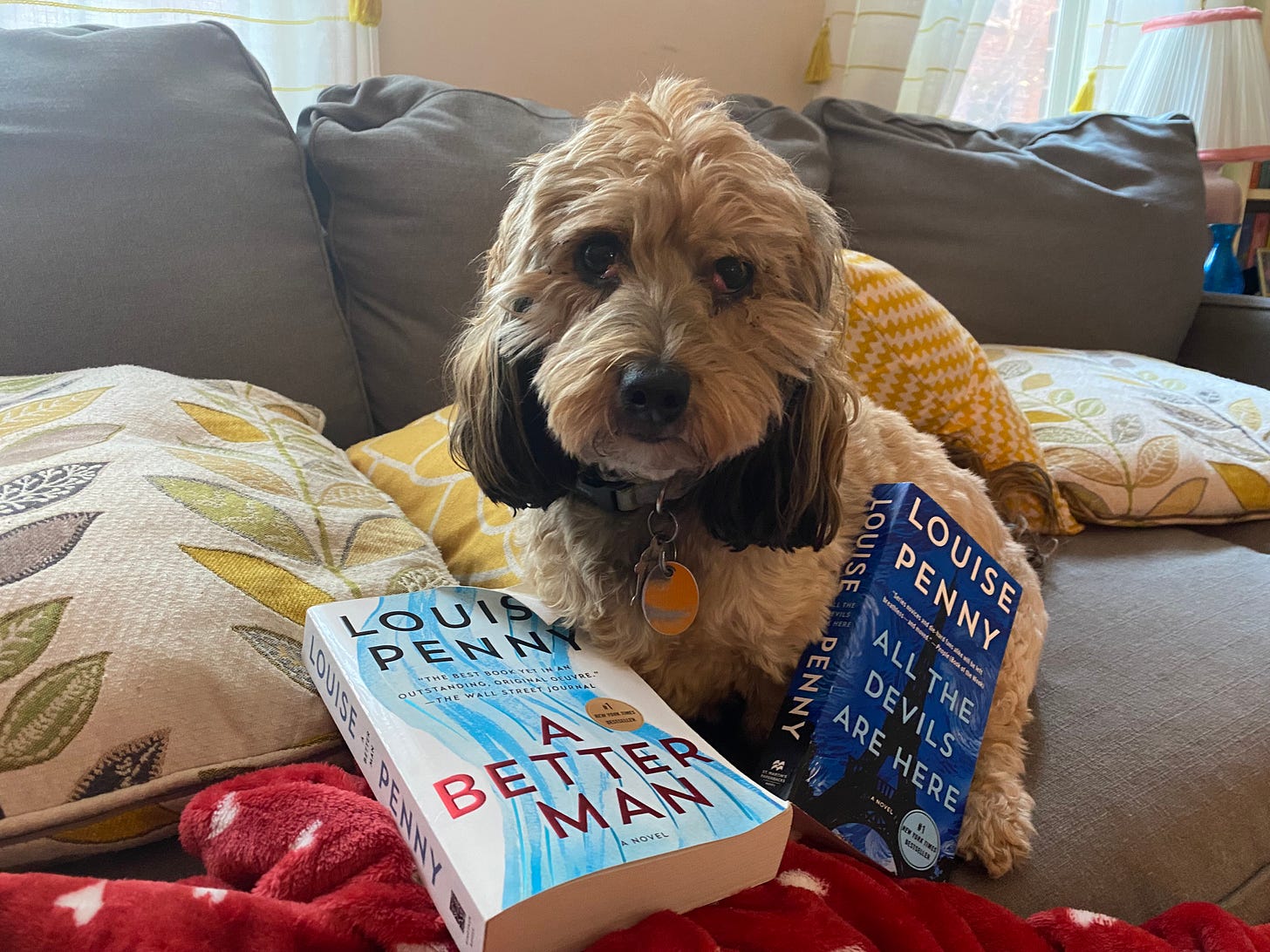Ducking Good: How Penny Uses Pets to Show Goodness Exists
Is there a stronger embodiment of all things good in the world than the animals we love
Hi friends,
Happy Thanksgiving to our American friends! We’re thankful for all of you for joining us her in our virtual bistro. This week’s essay is from Notes From Three Pines co-editor Elizabeth about the pets Louise Penny describes in her books. Elizabeth freely admits she chose the topic, in part, to have an excuse to share pictures of her dog.
— Elizabeth and Aya
P.S. Thanks again to Maria for the fan art.
“All of these creatures serve a purpose, even if that purpose is to have no real purpose other than to give warm, wonderful, unpredictable texture to my life every day. I wouldn’t have it any other way.”
— Susan Orlean, On Animals
“He had it himself, as did Reine-Marie, where in the presence of a dog. The need to kneel, to genuflect.”
— Louise Penny, A Brutal Telling
At the climax of How the Light Gets In, the tenth book in the Inspector Gamache series, Jean-Guy Beauvoir is at his lowest point. Yet, by the book’s end, he has emerged a hero, marrying the love of his life, Annie Gamache.
What helped the detective return to the path of goodness? Ruth’s pet duck Rosa.
As a reminder, during How the Light Gets In, Beauvoir is still struggling with the trauma of the factory shootout. He is under the thumb of Sylvain Francoeur, the corrupt chief superintendent of the Sûreté. Francoeur’s cronies supply him with the painkillers he’s addicted to, feeding a dangerous compulsion. The same Sûreté leaders send him, exhausted and rundown, on multiple dangerous raids, ignoring his precarious mental state.
He spends hours each day watching footage of the raid where he was shot and saw that his beloved mentor, Armand Gamache, left him for dead on the floor. Gamache kissed the wounded Beauvoir and said, “I love you,” to his protégé, but all Beauvoir fixates on the abandonment.
Worst of all, Beauvoir is estranged from Annie.
Alone, scared and depressed, he arrives at Three Pines with orders to arrest — or kill — Gamache. Instead, he finds the town empty except for the curmudgeonly old poet and Rosa. Ruth sits beside the struggling inspector and puts her cherished bird on Beauvoir’s lap. Separated from Gamache, he did not know the duck returned to Ruth after her migration. Ruth says:
She took the long way home … Some do, you know. They seem lost. Sometimes, they might even head off in the wrong direction. Lots of people give up, say they’re gone forever, but I don’t believe that. Some make it home eventually.
Ruth then gives Rosa — who is more than a prized possession, but an extension of herself — to Beauvoir and says they should both leave Three Pines. Then, with a final “I love you,” she leaves the detective and duck alone.
Later, reflecting on the old woman’s words, Beauvoir realizes Gamache saved him, just as Ruth saved Rosa. The revelation causes him to literally turn the car around, return to Three Pines and save Gamache from the officers conspiring against him.
It’s the type of scene Penny’s critics knock her for — too sentimental, too on-the-nose — but I think after a ten-book arc, it’s earned. It crystallizes the ultimate theme of the series — that, as Penny says, goodness exists — and shows that with love we can overcome the darkness.
Time and again, Penny uses pets to highlight this message because, after all, is there a stronger embodiment of all things good in the world than the animals we love and who love us? This dog owner says no, and I think Penny, who dedicated A Better Man to her recently deceased Golden Retriever, would agree with me.
Break from Tradition
While detective fiction often features animals (there are so many stories, in fact, renowned crime fiction critic Martin Edwards compiled an anthology of them Guilty Creatures), Penny’s approach to pets differs from the typical conventions.
Regularly, animals help to solve a case. Take the short story “The Adventure of Silver Blaze,” where Sherlock Holmes solves a case because the dog didn’t bark. Agatha Christie dedicated Dumb Witness, also known as Poirot Loses a Client, to her wire-haired terrier, Peter. In the same book, Poirot praises a fictional version of Peter named Bob:
The dog, he argues from reason. He is intelligent, he makes his deductions according to his point of view. There are people who may enter a house and there are people who may not—that a dog soon learns.
There are even cozy mystery series featuring magical, talking animals who solve murders themselves.
Penny plays with the trope of dog as clue in A Better Man, when Gamache solves the murder by knowing that the victim would not flee her home without her dog, but this is the exception, not the norm
More broadly, across genres, authors often give characters a dog to make them more sympathetic or write about a dog’s death to evoke emotions from readers.
“It’s a shorthand to show what a person’s character is by showing how they respond to an animal,” E.B. Bartels, author of Good Grief: On Loving Pets, Here and Hereafter, told me. “As for the dead dog trope, a dog dying is an emotional, sad thing for a lot of people. Some people think it’s a cheap tactic. That it’s like, ‘Oh, let me quickly pull out some heartstrings or cause some tears by having the dog die.’ But I personally feel it’s an ongoing thing in literature and movies because so many of us have had pets, especially dogs, and they just don’t live as long as we do.”
Animals, and dogs, in particular, pull at the heartstrings like nothing else. I recently attended a panel of romance writers who described receiving angry letters from readers when a dog died in a book they wrote. If a person died, they said, there were no such letters.
When I worked in a newsroom, it was a truism that if a dog was mentioned in the story, readers would call in asking for more information. Stories of people going through difficulties — fires, assault, homelessness — always hit harder if a dog was involved.
Arthur Chu, of Jeopardy! fame, wrote about this phenomenon in an essay for Salon following the murder of Cecil the Lion:
It’s widely acknowledged that people get much more distressed over the death of a dog or a cat in a movie than of a human being. … It’s far more reliable than trying to characterize them by how they treat their fellow human beings. Just like it’s far easier to get people riled up about excessive force used by SWAT teams when you tell stories of cops shooting the family dog than when you tell stories of them shooting innocent people, so much so that activists against police violence consciously use pet killings as a rallying cause.
I think it’s the pettiness of killing a dog, or killing a lion … compared to killing a woman or man. There’s no way you can possibly spin it as necessary … to lure Cecil out of his park and shoot him. The targets are clearly ‘innocent,’ so the killing is clearly gratuitous.
This innocence we project on animals stems from our simple relationship with our pets, far less complicated than those with other people. We don’t carry baggage or long-simmering resentments towards our pets. Our relationships with them are straightforward, simple.
Our pets do nothing but love us. I feed, walk, pet and play with my dog Ellie. In exchange, she offers me a love so pure that I’m smiling just thinking about it. When I walk in the door after a day at work, she jumps up and down with excitement as though nothing so good has ever happened.
I found myself tearing up as Bartels described a conversation she had with a dog-loving Episcopal Bishop on the question of if dogs go to heaven (an outstanding question in many branches of Christianity). The bishop said it can feel like animals have souls like humans do, but animals are pure, unlike people who can sin. Animals, then, get an automatic pass into heaven. They don’t have to repent because they’re already good.
And, they bring out the best in us. Each morning, my dog wakes up overwhelmingly excited to be alive. She does the same thing every day — walks the neighborhood, eats her kibble, snuggles with me — but she does it with a joy I find inspiring. I want to bring that same zeal to my life.
In the acknowledgments of A Better Man, Penny describes the same experience of learning from her pets:
Bishop is the last in a long line of golden retrievers who have shared, and improved, our lives. Who taught us how to be more generous, more kind, way more forgiving, more patient. More human.
Her characters learn the same lessons.
Ducking Good
Penny uses animals to add complexity to Ruth’s character starting in book two, A Fatal Grace, even before Rosa appears in the next book, The Cruelest Month. Ruth’s relationships with animals reveal a generosity in her that had previously been hidden. They show she is more than a drunk, lonely old poet prone to criticizing her friends. She has the capacity to love.
In Fatal Grace, every evening at 5, the batty old woman walks down to a bench in the village center, an activity the townspeople all call her “beer walk.” It’s a running thread through the book, not explored until the book’s final pages. Then, Gamache explains the routine to a judgmental young officer:
Ruth Zardo had a dog named Daisy. I met Daisy. The two were inseparable. Two stinky old ladies limping and growling through life. This past autumn Daisy grew weak and disoriented and finally the end was near. Ruth took her old friend on one last afternoon walk. It was five o’clock and they went into the woods where they’d gone each day. She took along a gun and when Daisy wasn’t looking, she shot her… It’s called a beer walk because most farmers before they put their family pets down take a twelve pack with them, get just drunk enough, and do the deed. Ruth was sober. It was an act of love and mercy and formidable courage.
It’s a dog that drives Ruth to an act of selflessness. She cannot watch her beloved, innocent dog suffer any longer and chooses to end her life. That she did so sober — when she is so often drunk — shows the solemnity of the moment.
Later, Ruth similarly puts her pet first when she encourages Rosa to migrate south with the other ducks, even knowing that she may not return. (This after she spends hundreds of pages dressing Rosa in human clothes to keep her warm.)
The narcissistic poet prioritized the needs of her adored animals above her own self-interest. Beneath her gruff exterior lies a softness, an ability to love that she prefers to keep hidden. When reflecting on the death of Rosa’s sister, Lillium, Ruth explains why she keeps those she loves away:
Lillium was meant to fight her way out of her shell. The struggle would make her strong. Ruth’s helping had had weakened her. Until late one night, Lillium had died in that same helping hand. It had confirmed all Ruth’s fears. Kindness killed. No good could come of helping others. And so Ruth made it a policy to turn her back. Not for herself, but to protect those she loved.
She believes it is a kindness to drive those she cares about away, a characteristic that makes even more sense when we learned her cousin died in an ice-skating accident that was Ruth’s fault.
Ruth struggles to describe these feelings in direct words — turning instead to metaphor in poetry — but when it comes to animals, she can do it. The pets, their sweet innocence, make it harder for Ruth to hide the goodness within her.
Good(ness) Dog
Penny is obsessed with goodness. On her website, she writes:
And finally, a small note about the themes in my books. They’re inspired by two lines from a poem by WH Auden, in his elegy to Melville. Goodness existed, that was the new knowledge/his terror had to blow itself quite out to let him see it. How powerful is that?
My books are about terror. That brooding terror curled deep down inside us. But more than that, more than murder, more than all the rancid emotions and actions, my books are about goodness. And kindness. About choices. About friendship and belonging. And love. Enduring love.
If you take only one thing away from any of my books I’d like it to be this: Goodness exists.
Her plots, her characters and even the village of Three Pines itself all advance this idea, but she puts it most explicitly in the sections of the books narrated by an unlikely character, the Gamache’s dog Henri. The couple adopted Henri after his owner died in A Fatal Grace.
Penny often uses Henri for comedic relief. He farts nearly constantly, clearing rooms with the foul odor. He has a crush (puppy love, perhaps?) on Rosa. She reminds us again and again that he is not a smart dog, but his uncomplicated approach to the world makes it easy for him to love.
In How the Light Gets In, before Beauvoir’s run-in with Ruth and Rosa, the adrift detective shares an awkward elevator ride with his ex-mentor, former protégé Isabelle Lacoste and a stinky Henri. Completely unaware of the awkwardness, Henri affectionately licks Beauvoir, giving him the attention and love Gamache and Lacoste wish they could provide. Again, that simplicity gives him an edge in expressing love.
That same capacity for love that helps Gamache heal from the trauma of the factory shooting and losing Agent Morin, as they take long walks around a frigid Quebec City and play endless games of fetch. Henri’s non-judgmental, pure adoration for Gamache provides him support when he needs it most.
Henri’s simple mindset — he is, after all, a dog — allows him to express what he thinks. He has no need to cloak it in metaphor or to hide his vulnerability, giving Penny the opportunity to explicitly state her thesis in The Long Way Home:
He turned his gaze to Rosa. Who also adored an elderly woman and was terrified her Ruth would one day vanish, as his Emilie had. And she’d be all alone. Henri stared and stared, hoping Rosa might look at him and realize that even if that happened, the wounded heart would heal … He still loved Emilie, but now he also loved Armand and Reine-Marie. And they loved him. That was home. He’d found it again.
Henri is not the only one who finds home because of love. Gamache takes in Beauvoir and Isabelle Lacoste when no other department wants them. His guidance, mentorship and, yes, love, allow them to thrive where they could not elsewhere.
In A Trick of The Light, Myrna thinks “Not for the first time Three Pines struck Myrna as the equivalent of the Humane Society. Taking in the wounded, the unwanted.” When the “unwanted” find the tiny village — and the love its residents give each other — they grow into good people.
Penny believes that given the right support and love all people can blossom. Take Amelia Choquet, the angry young woman living on the fringe of society. When Gamache takes a chance on her, she becomes a standout cadet at the police academy. Olivier, as Aya documented, lies constantly and swindled a lonely old man out of his valuable antique collection, but provided Gamache shelter when he needed to hide from Francouer. And, let’s not forget Vincent Gilberte, the Asshole Saint, who is, well, an asshole but also a man who spent his career working with people on the fringes of society.
It’s often easier for us to see the potential for goodness and love in our pets than it is in humans, as Chu describes in his essay on Cecil the lion. Penny’s animals, like Gracie the “ratmunk” foundling the Gamaches adopt, help to remind us of the message she wants us to receive from her books.
A Miracle
As I write this my dog, whose previous owners gave her up, is sitting next to me, nudging occasionally with her little paw or head to request I stop typing and start petting her. She constantly reminds me of the love she feels for me and, in turn, I’m filled with happiness (and dopamine) just looking at her.
The Inspector Gamache books and Ellie will always be intertwined for me because I first discovered her books while listening to them and taking my newly adopted dog on long walks around my parents’ neighborhood.
Early in Still Life, Penny includes a scene narrated from the victim’s dog, Lucy:
Every day for Lucy’s entire dog life Jane had sliced a banana for breakfast and had miraculously dropped one of the perfect disks on the floor where it sat for an instant before being gobbled up. Every morning Lucy’s prayers were answered, confirming her belief that God was old and clumsy and smelt like roses and lived in the kitchen.
But no more.
Lucy knew her God was dead. And she now knew the miracle wasn’t the banana, it was the hand that offered the banana.
I cried as I heard that passage because it gave me hope that Ellie feels the same way about me that I feel about her: that her presence in my life is a miracle.
Elizabeth is a writer living in Washington, D.C., who has contributed to Parade, Time, Slate and USA TODAY, among other publications. She writes What to Read If, a weekly book recommendation newsletter, and particularly adores Louise Penny’s books on audio.
Notes from Three Pines is a short-run newsletter run through Substack celebrating and exploring Louise Penny’s Inspector Gamache books. Love Gamache or Ruth’s duck Rosa? Reply to this email, leave a comment or email notesfromthreepines@substack.com.
If you’re reading this on Substack or were forwarded this email, and you’d like to subscribe, click the button below.
Disclosure: We are affiliates of Bookshop.org and will earn a commission if you click through and make a purchase.











My significant other and I will be buried in a pet cemetery with the ashes of our two Italian Greyhounds, Jazz and Rock. They currently reside in an urn on our fireplace mantle. On the back of our communal headstone is Agnes Sligh Turnbull’s quote: “Dogs’ lives are too short. Their only fault, really.”
Wonderful post and so encapsulates how much we need to protect and cherish our animal friends.
You might like this extract from Jane Kenyon’s poem:
Having it Out with Melancholy
6 IN AND OUT
The dog searches until he finds me
upstairs, lies down with a clatter
of elbows, puts his head on my foot.
Sometimes the sound of his breathing
saves my life—in and out, in
and out; a pause, a long sigh. . . .